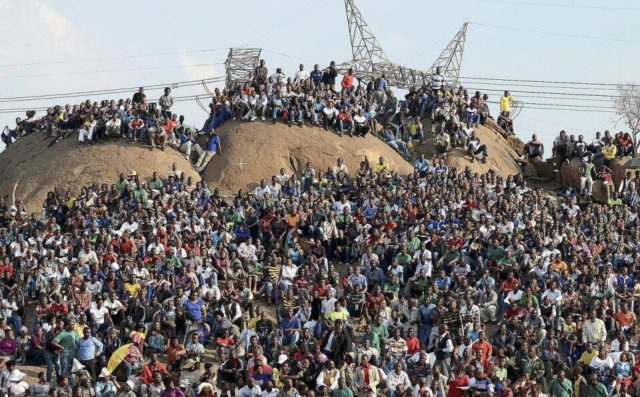Spotlight on lack of justice for many of the families whose lives were transformed on August 16, 2012.
NINE years since the Marikana massacre, the deaths of 44 people have continued to put a spotlight on policing concerns and the lack of justice for many of the families, whose lives were transformed on August 16, 2012.
A total of 34 mineworkers, who embarked on an industrial strike, were killed when SAPS officers fired live ammunition in their direction, outside the Lonmin Mine in Marikana in the North West.
The remainder of those killed died in the lead-up to the strike action – led by workers who were demanding a pay increase.
Amcu president Joseph Mathunjwa, who has been outspoken about the matter for years, said the conditions of mineworkers remain the same. He also bemoaned the lack of compensation for workers who were affected by the massacre.
Mathunjwa said the ANC had to take political responsibility for the lack of movement in providing the families with justice.
“The conditions of workers have not changed. If you look at the communities of these mining towns, they still live in squalor. Even if you look at Marikana itself, it is the same as it was.
“Nine years down the line, when workers were killed in broad daylight, justice has been delayed. That means justice has been denied. I do not think anyone will be arrested.
“Even today, some of the injured workers still have not been paid a cent. I have even written to the president and, still today, we have not heard anything. The ruling party should take political responsibility because it is their government,” Mathunjwa told Independent Media.
The National Union of Mineworkers said on Sunday that it called for unity and for the deaths of mineworkers not to be used as a political tool.
The union has called on the government to speed up compensation for affected families and victims.
On the justice factor, the Socio-economic Rights Institute, which represents some of the affected families, said very little movement had been seen on the prosecution. No one has been prosecuted.
“To date, only nine police officers have been charged. Four police officers – charged for crimes relating to hiding the circumstances around the death of Motiso Otsile van Wyk Sagalala – have all been acquitted said executive director at SERI Nomzamo Zondo.
“Currently, six police officers are standing trial for the death of Pumzile Sokanyile, including then-North West deputy police commissioner Major-General William Mpembe, who is also charged with the murders of mineworkers Semi Jokanisi, Thembelakhe Mati, and police officers Warrant Officer Tsietsi Hendrik Monene, and Warrant Officer Sello Ronnie Lepaauku.
“Mpembe is also charged with the attempted murders of six surviving mineworkers and one police officer,” she said.
On whether public policing has improved over the years, Dr Guy Lamb, from the University of Stellenbosch, said there have been some notable improvements in public order policing.
He said this was evident with extra personnel added over the years. However, it was not measurable on a scale of how many lives had been saved.
Lamb said the recent unrest in KwaZulu Natal and Gauteng had highlighted failures, that saw police officers overwhelmed by sporadic unrest, with slow reaction and not enough personnel.
– Political Bureau








